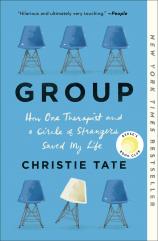Reading Group Guide
Discussion Questions
Group: How One Therapist and a Circle of Strangers Saved My Life

1. Christie begins GROUP by detailing the first time she “wished for death.” She spends the rest of chapter one describing the contrasts of her life --- an unwitting outsider might assume she has it all, yet internally she struggles with profound loneliness. Were you surprised to find that Christie could struggle so much with her self-worth given her success? Have you ever felt others’ perception of you did not match your own perception of yourself?
2. One of Christie’s biggest reservations about participating in Dr. Rosen’s group is the fact that secrets are discouraged. How does this central tenet of Dr. Rosen’s group sessions affect the ways she interacts with her fellow members and how she forms relationships with the other patients? Think back to a time in your own life when you committed to something that was emotionally uncomfortable for you. Was it worth the risk?
3. In chapter six, Christie describes how once during a meeting, no one says a single word for the entire 90-minute session. What do you think was Dr. Rosen’s intent with this exercise? Is this kind of silence productive or a waste of time?
4. When Christie leaves an indignant voice mail on Dr. Rosen’s answering machine, he uses the moment to “celebrate” her anger (p. 93). What are the benefits of uplifting feelings that are, in Christie’s words, “ugly, irrational, petty, reckless, spiteful, and spewing” (p. 94)? How does expressing this anger freely affect her relationship with Dr. Rosen and the group?
5. Recall some examples of where the body as a site of externalized trauma figures prominently in GROUP. Can you think of reasons why Christie’s reaction to pain is sometimes so physical?
6. Christie recounts the dysfunctional and frustrating details of several romantic and sexual relationships throughout GROUP. What lessons does she learn from each affair, and how are they demonstrated in not only her love life but also her life in general? Could you relate to any of her relationship struggles in particular?
7. Dr. Rosen’s methods are unorthodox, and Christie expresses doubt about their effectiveness throughout the memoir. This is especially true when Christie dates Dr. Rosen’s other patients, Jeremy and Reed. Do you think Dr. Rosen ever oversteps boundaries or becomes too invasive? Do you agree with how Dr. Rosen distinguishes between keeping a secret, which is toxic, and maintaining privacy or having boundaries, which is not necessarily unhealthy?
8. In chapter 28, Christie and Max engage in an intense fight in front of Dr. Rosen and the other group members during a session. At the end of the chapter, they reconcile with a wordless hug. How do these moments of catharsis influence Christie’s feelings about and openness toward relationships?
9. When he offers to hold Christie after she and Brandon break up, Dr. Rosen observes, “You’re on the edge of a new identity and a new way of thinking about yourself” (p. 243). Can you think of inflection points in your life when you reevaluated the way you exist in the world?
10. Soon after Christie vows to say “yes” more and reclaim her voice in her daily life, she reaches out to John, resulting at long last in a healthy, loving relationship. In what ways is Christie’s therapy about understanding and respecting herself? How do those two concepts --- attaching to others and connecting to yourself --- interact?
11. The three parts of GROUP correspond to the three groups Christie joins along her therapy journey. Reflect back on how Christie and her approach to the struggles she faces evolve over the course of the book. In your opinion, what are some key moments that demonstrate to you that group therapy was working for Christie?
12. Christie’s relationship with her three groups --- the members within them and the dynamic as a whole --- defines her transformation from a loner with an “unscored heart” (p. 7) to someone who accepts help when she struggles to “tell the truth of [her] desire” (p. 275). Think about your own “group,” whatever that means to you: it could be friends, family, community members, coworkers and beyond. How have those individuals contributed to your growth? If you could thank them for the role they have played in your life, what would you say? In what ways has your own group served as a witness for you as you struggle, both through quotidian challenges and major life upheavals?
13. For readers who have never experienced group therapy: After reading GROUP, why do you think Christie felt moved to share her experience? Did the book change any preconceived notions you had about group therapy? Do you think you would be a good candidate for this type of therapy? Why or why not?
14. For readers who have experienced group therapy: What did you appreciate about Christie’s depiction of group therapy in GROUP? Is/was your experience similar or different? How so?
Group: How One Therapist and a Circle of Strangers Saved My Life
- Publication Date: June 1, 2021
- Genres: Memoir, Nonfiction
- Paperback: 304 pages
- Publisher: Avid Reader Press/Simon & Schuster
- ISBN-10: 1982154624
- ISBN-13: 9781982154622







